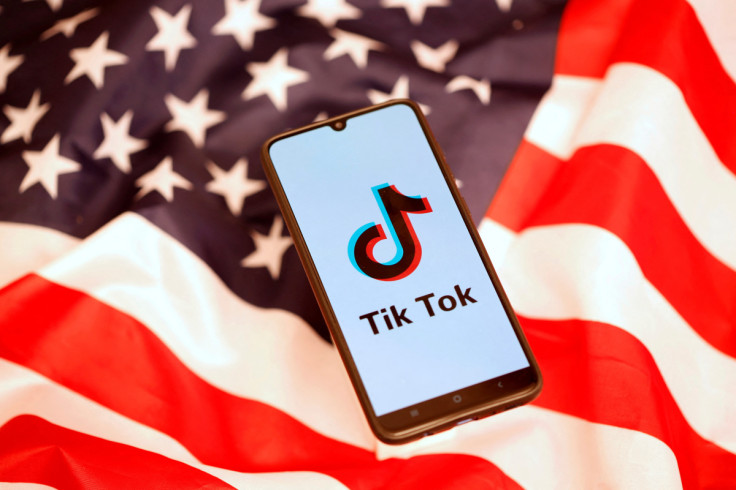Chinese Officials, State Media Had 'Spike' In Twitter Activity During Congress' TikTok Grilling: Report
KEY POINTS
- The Chinese government reportedly defended TikTok 'before and after the hearing'
- ASD group says there was 'a noticeable spike' in Twitter activity immediately after Chew stood before lawmakers
- China has said it will 'firmly oppose' a forced sale of TikTok
During the week that dragged TikTok CEO Shou Zi Chew in front of Congress, Chinese diplomats and state media outlets had a "noticeable spike" in Twitter activity related to the TikTok hearing, a new report revealed, raising further questions about the Chinese government's potential ties to the western-flagged short video app.
"Chew assured the committee that TikTok functions independently of the Chinese Communist Party, but before and after the hearing, the Chinese government devoted significant state resources to defend the company – seemingly calling into question TikTok's independence," bi-partisan national security advocacy group the Alliance for Securing Democracy (ASD) said in a report published Thursday.
The group said Chinese officials and state media "mounted a sizable influence campaign in defense of TikTok" from March 20 through March 26. The narratives ranged from amplifying Chew's statements "to paint the app in a benign light" to elevating the possible consequences of banning the popular video-sharing app, according to ASD.
Chinese propagandists used 5 main narratives to try to shape US public opinion. They:
— Alliance for Securing Democracy (@SecureDemocracy) April 6, 2023
👉Painted the app in a benign light
👉Hyped the app's popularity
👉Criticized members of Congress
👉Denigrated the US system
👉Portrayed criticism of #TikTok or China as xenophobic
In the said week of the hearing, ASD found that officials from China and state media tweeted about the ByteDance-owned app "nearly 200 times." In comparison, the accounts of Chinese diplomats and state media outlets mentioned the app "fewer than 150 times over the entirety of January and February 2023."
Furthermore, ASD's data revealed that there was "a noticeable spike in activity in the immediate aftermath of the hearing," as Chinese accounts mentioned TikTok "more than 75 times on March 24 alone," with the focus being related to Chew's appearance at Congress.
Most of the tweets throughout the week came from Chinese state media accounts, as per ASD. The accounts posted more than half of TikTok-related tweets.
The report went on to reveal how Chinese diplomats such as Chinese Consulate General Zhang Meifang, assistant Minister of Foreign Affairs Hua Chunying, China's cultural consular to Pakistan Zhang Heqing, Ministry of Foreign Affairs spokesperson Mao Ning, and various state media accounts such as CGTN and Global Times mentioned TikTok in their tweets in the said week, seemingly defending the social media company.
Michael H. Posner, Director of the Center for Business and Human Rights at the Stern School of Business at New York University, told the New York Times that Chinese officials "clearly feel a stake" in TikTok's current situation with the U.S. government.
Over on the TikTok app, many users came to Chew's defense, with the hashtag #TikTokBan getting more than two billion views on the app. Brooke Oberwetter, a spokesperson for TikTok, said the TikTok CEO's popularity on the app was an organic process, adding that the app tags "China state-controlled media" accounts so users know they are engaging "with content that may be controlled or influenced by a government," as per the New York Times.
Meanwhile, U.S. senators Mark Warner, D-Va., and John Thune, R-S.D., continue to push for the proposed Restrict Act, which should grant the Commerce Department new powers to assess, address and potentially block transactions related to national security risks.
Warner and Thune wrote in a Wall Street Journal essay Wednesday that the bill was "designed the president's international economic authorities for the digital era" and "establish a risk-based process to deal with foreign-adversary technology."
The bill was introduced earlier last month and is just one of several other bills targeted at TikTok and other apps deemed to pose a threat to national security. If approved by lawmakers, the Restrict Act would apply to China, Russia, North Korea, Iran, Venezuela and Cuba.
A day before Chew's appearance at the Congress hearing, Shu Yuting, a spokesperson for China's Commerce Ministry, said the government "will firmly oppose" a forced sale of TikTok. The United States wants TikTok to either be sold or be banned in the country.
Shou Chew says TikTok's parent company ByteDance isn't owned or controlled by China https://t.co/sQXPpwzThW pic.twitter.com/lF8C93PvZo
— Bloomberg (@business) March 23, 2023
Chew insisted before Congress late last month that TikTok's parent company ByteDance, was a private company and does not answer to the Chinese government. Oberwetter said in a statement after the hearing that Chew was "dominated by political grandstanding" even if he came to the hearing prepared.

© Copyright IBTimes 2024. All rights reserved.












